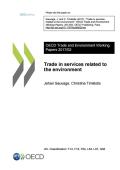
This paper discusses the nature and scope of international trade in environmentally related services, and analyses the implications that services trade restrictions have on the provisions of these services domestically and abroad. Numerous services appear crucial to the delivery and proper functioning of environmental goods and equipment be they a wastewater-treatment facility or a renewable power plant. By helping lower the costs of these services and improving access to world-class suppliers, trade policy can contribute alongside energy and environmental policy to the prevention and abatement of greenhouse gas emissions and pollution in all its forms. Besides clarifying the role and scope of services related to the environment, the analysis undertaken in this paper suggests that the restrictions that countries impose on services trade may have a detrimental effect on the provision of environmental activities through the establishment by specialised firms of a commercial presence abroad, i.e. through mode 3 trade in services.
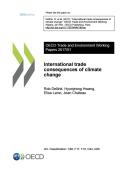
This report provides an analysis of how climate change damages may affect international trade in the coming decades and how international trade can help limit the costs of climate change. It analyses the impacts of climate change on trade considering both direct effects on infrastructure and transport routes and the indirect economic impacts resulting from changes in endowments and production. A qualitative analysis with a literature review is used to present the direct effects of climate change. The indirect impacts of climate change damages on trade are analysed with the OECD’s ENV-Linkages model, a dynamic computable general equilibrium model with global coverage and sector-specific international trade flows. By building on the analysis in the OECD (2015) report "The Economic Consequences of Climate Change", the modelling analysis presents a plausible scenario of future socioeconomic developments and climate damages, to shed light on the mechanisms at work in explaining how climate change will affect trade.
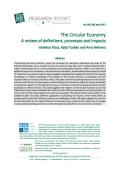
Transforming the linear economy, which has remained the dominant model since the onset of the Industrial Revolution, into a circular one is by no means an easy task. Such a radical change entails a major transformation of our current production and consumption patterns, which in turn will have a significant impact on the economy, the environment and society. Understanding these impacts is crucial for researchers as well as for policy-makers engaged in designing future policies in the field. This requires developing an in-depth knowledge of the concept of the circular economy, its processes and their expected effects on sectors and value chains. This paper reviews the growing literature on the circular economy with the aim of improving our understanding of the concept as well as its various dimensions and expected impacts. On the basis of this review, it attempts to map the processes involved and their application in different sectors. The paper suggests that research on the circular economy is currently fragmented across various disciplines and there are often different perspectives and interpretations of the concept and the related aspects that need to be assessed.
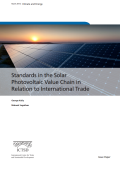
The manufacture of clean energy goods and provision of clean energy services, vital to climate change mitigation efforts, increasingly takes place through globally dispersed supply chains. In these supply chains, parts and components often cross borders multiple times before feeding into a clean energy power plant that is set up with the help of foreign or domestic firms that provide services such as design, engineering and construction as well as operations and maintenance. Non-tariff measures such as standards have the potential to impact trade much more than tariffs and nowhere is this truer than for solar-photovoltaic (PV). Policymakers in the trade as well as energy spheres thus need to be aware of the type of standards that are being set along various segments of the value chain for solar-PV for both goods and services as well as the standards development organisations that are involved.
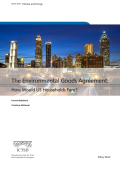
The Environmental Goods Agreement (EGA), initiated in 2014, is intended to reduce tariffs on a list of goods by the signatories, after which concessions will be extended to all WTO members based on the most-favoured-nation principle. While the main objective for reducing tariffs on environmental goods in an accelerated manner is environmental concerns, including the need to address climate change, it also makes good economic sense. Among the benefits are reduced consumer prices for environmental goods. Moreover, EGA tariff elimination can spur the uptake of energy efficient goods, in turn resulting in energy savings.
This paper looks into the case of possible consumer benefits of the EGA in the United States. The authors find that total household savings from the price effect of EGA tariffs cuts overall would amount to roughly $845 million per year, disproportionally benefitting lower-income households. Moreover, the paper estimates that an increased use of energy-efficient light bulbs could save 238 million kilowatt hours, which is equivalent to 124,000 tons of coal each year, or 120% of the greenhouse gas emissions from coal in the state of Maine.
